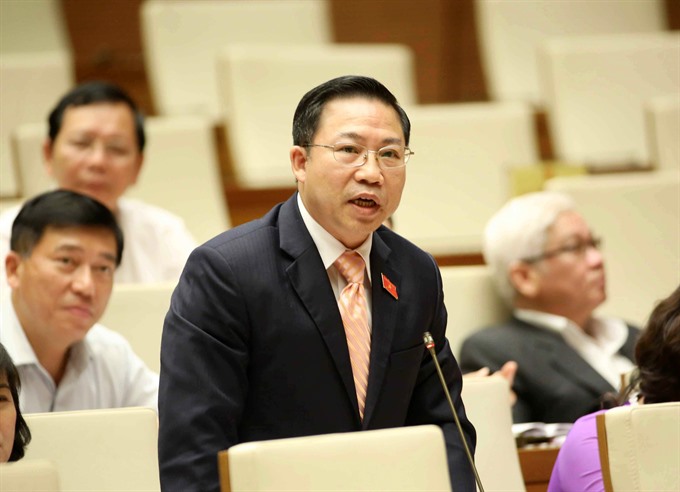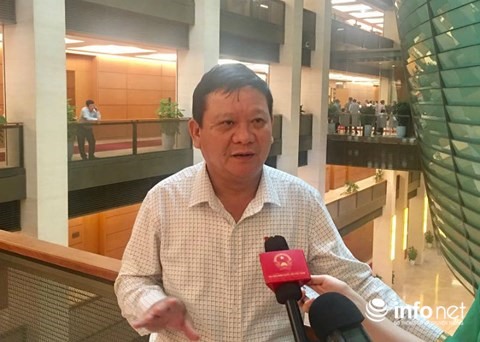.jfif) Opinion
Opinion

The controversial cybersecurity law was passed by the National Assembly (NA) on June 12 with 86.86 per cent approval. On the sidelines, NA deputies talk to An Ninh Thủ Đô (Capital Security) newspaper on how the bill won’t harm Constitution-mandated civil rights or initiate mass surveillance.
 |
| National Assembly deputy Lưu Bình Nhưỡng, representing Bến Tre Province’s delegation. — VNA/VNS File Photo |
The controversial cybersecurity law was passed by the National Assembly (NA) on June 12 with 86.86 per cent approval. On the sidelines, NA deputies talk to An Ninh Thủ Đô (Capital Security) newspaper on how the bill won’t harm Constitution-mandated civil rights or initiate mass surveillance. The subjects of the bill are criminals, not common people, they stressed.
Lưu Bình Nhưỡng, permanent member of the National Assembly’s Committee for Social Affairs:
What is your take on the recently adopted cybersecurity law that has caused heated debate in the country?
The law was passed with a high approval rate. Several internet websites and forums in recent times have slandered the purpose of the bill and opposed the Party’s direction, stoking unreasonable public anger against National Assembly deputies like me. This has further consolidated us lawmakers’ conviction on the need to approve the bill.
You are saying that recent developments have influenced your decision to pass the cybersecurity bill?
There was an explosion of toxic content and information in recent days. My own Facebook profile was also tagged in posts sharing content that I find disagreeable. I believe NA deputies are particularly perceptive and the wave of misleading information on the internet just fuels their determination to pass the bill, especially those who felt ambivalent before.
You are known as being quite vocal in your criticism of the draft cybersecurity law, do you think many will be surprised with your ‘change of heart?’
I have reservations about certain articles of the draft law, it’s totally normal. Those are the opinions of an NA member while the draft law was being developed; it’s not that I oppose the law.
What drives me and other lawmakers to quickly introduce this law is that it will help the fight against new types of criminals and ensure the country’s stability.
Many people are worried that the cybersecurity law will curtail freedom of speech, and that is the source of opposition to the law. What do you think about this?
I think the concerns are not justified. The civil rights law has already stated clearly that acts constituting violations of other people’s honour and dignity are violations of their civil rights.
When violations of civil rights happen on a larger scale and pose serious dangers to society, then criminal intents are considered and fall under the jurisdiction of the penal code.
The cybersecurity law simply gives authorities a tool to manage security issues in the cyberspace, it’s not meant to suppress freedom of speech. Such interpretations are a total misunderstanding.
So what you are saying is that people should not be too concerned?
I affirm that the cybersecurity law’s targets are cybercrimes and cybercriminals, not the people.
I have several times expressed my line of thinking to the NA National Defence and Security Committee. My stance has always been that the cybersecurity law must have its highest priority set on the suppression of hi-tech crimes; issues regarding social order and security are the concerns of several other laws, not just the cybersecurity law, as I have said before.
Many said that some vague provisions in the cybersecurity law would cause difficulties for internet users, how do you comment on this?
In my opinion, no law is perfect. Most laws must be reviewed some time after implementation for adjustments.
The birth of a new law is a response to social demand. I myself was not entirely convinced before, but homeland security and the country’s interests must be prioritised above all else.
Cybercrimes have become extremely sophisticated and I believe every deputy and every person would agree that the country’s existence and security is a number one priority. As long as the country remains, we still have chances to fix what’s wrong and become better.
 |
| Major General Đặng Ngọc Nghĩa, permanent member of the National Assembly’s National Defence and Security Committee |
Major General Đặng Ngọc Nghĩa, permanent member of the National Assembly’s National Defence and Security Committee:
What are your comments on the passing of the cybersecurity law?
I think that with the current situation, all countries are managing their cyberspace and cybersecurity though methods may differ from one another.
In Việt Nam, most of our information equipment and devices are imported, which greatly influences the provisions of the law.
In recent times, we have made certain progress in the field of cybersecurity, but not enough, with many cases of exploiting loopholes in information networks to conduct anti-State propaganda and disrupt economic and airway activities.
Many experts have said that the cybersecurity law will mean internet users can easily be monitored and manipulated. Do you think these concerns are justified?
Civil rights are provided for in the Constitution, whereby the people are not monitored.
However, Party and Government agencies, as well major economic institutions such as airport authorities and banks hold critical information related to national security, in these cases the network will be monitored, but not the individuals.
For example, Enterprise A under the management of a certain ministry uses network infrastructure to disseminate Anti-State propaganda or slandering information, they would receive a warning. The security officials would step in to investigate when the managing agency of that enterprise submits a request for such action.
When the law is introduced and mechanisms take effect, we will be able to better manage the cyberspace and make it a healthy environment. — VNS




